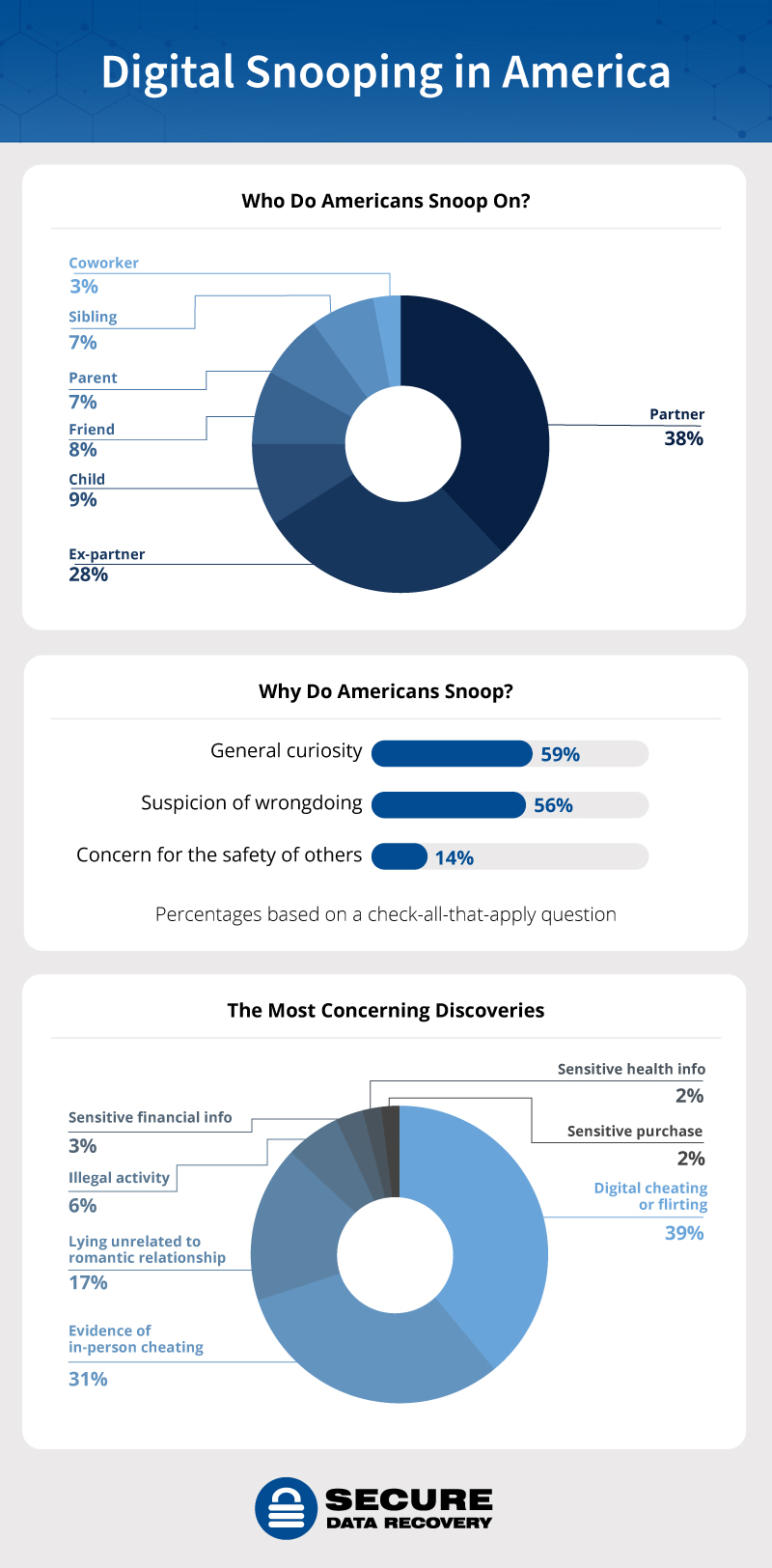A recent Secure Data Recovery survey asked Americans about their digital snooping habits and opinions to gain a better understanding of when and why people snoop—and who is most likely to do it. Spoiler alert: it’s usually the people closest to us.
Digital Snooping Is Common
The survey found that 82% of respondents have snooped through someone else’s device. While most Americans admit to digital snooping, some do it more than others. 85% of millennials, who came of age during the rise of smartphones and social media, are more likely to snoop than Gen Z (77%). Gender also appears to play a role, as women are more likely to snoop than men.With this many people admitting to snooping, it’s also interesting to note who regrets it after. While most people feel bad after peeking at their loved one’s devices, over 1 in 3 snoopers report not feeling guilty about it at all. Perhaps these snoopers feel their behavior is justified—or maybe they just haven’t been busted yet. In fact, a surprising 81% of Americans have never been caught snooping.
Snooper’s remorse seems to vary by age and gender. Men are more likely to regret it than women, and (perhaps surprisingly) baby boomers are the generation least likely to regret snooping.
Why do some people choose not to snoop? Only 10% said it was because they believe snooping is not appropriate. Another 10% said it was because they have had no reason to, suggesting they might do so if they felt the need.
What’s Snooped Through and Why?
When people decide to snoop, there are clear patterns in what kind of things they look at.- Messages: Almost all snoopers (87%) look at messages when they secretly access someone’s device. This category represents a large quantity of information including text messages, emails, and social media DMs.
- Photos/videos: While snoopers may not find pictures as interesting as texts, they apparently still find them worth peeking at. Nearly half (44%) of survey respondents admit snooping around in other people’s photos or videos.
- Browser history: Snoopers also want to know what their loved ones are looking at online, as over 38% check out browser history.
- Private notes: A smaller group of snoopers (12%) look at a device’s private notes.
- Location history: 9% want to know where their loved ones have been by checking out their location history.
When snoopers make concerning discoveries, 70% said they found evidence of cheating or inappropriate flirting, whether digital or in person. Some 17% caught someone in a lie that was unrelated to relationships, and a small percentage even discovered illegal activity.
Biggest Snooping Targets
Perhaps unsurprisingly, most digital snooping involves romantic partners, indicating that trust issues and insecurities often accompany romantic relationships. However, people also admit to snooping on the devices of other family members, friends, and even work colleagues.Two-thirds of survey respondents admitted to snooping on their current or former significant other, using digital devices as an easy way to investigate their activities. Perhaps slightly more surprising is that almost as many people snoop on their ex-partners (28%) as their current partners (38%).
Next on the list, 9% admitted to snooping on their children’s devices, showing parents are monitoring their kids’ online activity. Finally, 8% of Americans snoop on friends’ devices. As to why, your guess is as good as ours: Curiosity? Jealousy? Concern?
While not in the majority, a few people also report snooping on their siblings (7%), parents (7%), or coworkers (3%).
What Can You Do About Snooping?
With our lives increasingly conducted online, the temptation to snoop is ever present. Now that you know how prevalent digital snooping really is, it’s up to you to decide how to handle it in your own life. It’s smart to set healthy boundaries and work on building trust with people you know. If you feel the need to snoop, you may want to ask yourself how that reflects on you or your relationship.Psychological questions aside, you can take technological steps to prioritize your digital privacy. Many basic digital security measures can help prevent snooping, like making smart password choices, using two-factor account authentication, and enabling the Find My iPhone/Device feature. Another way to keep sensitive information from roaming eyes is to level up your lock-screen game. Enable automatic lockout with a screen saver and limit the notifications that show on your lock screen.
If important information of yours has already been compromised or deleted, you may need the help of a professional data recovery service to restore your peace of mind. If not, make sure to take steps today to reduce the chances of snooping or other digital dangers compromising your personal information.
Methodology
Secure Data Recovery asked over 1,000 people across the United States about their digital snooping habits and opinions. Respondents’ ages ranged from 18 to 76 years old.
Read next: Need a Free VPN in 2023? Here Are the Best Ones
by Irfan Ahmad via Digital Information World


No comments:
Post a Comment